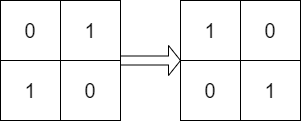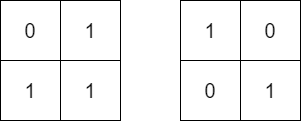Description
Given two n x n binary matrices mat and target, return true if it is possible to make mat equal to target by rotating mat in 90-degree increments, or false otherwise.
Example 1:

Input: mat = [[0,1],[1,0]], target = [[1,0],[0,1]] Output: true Explanation: We can rotate mat 90 degrees clockwise to make mat equal target.
Example 2:

Input: mat = [[0,1],[1,1]], target = [[1,0],[0,1]] Output: false Explanation: It is impossible to make mat equal to target by rotating mat.
Example 3:

Input: mat = [[0,0,0],[0,1,0],[1,1,1]], target = [[1,1,1],[0,1,0],[0,0,0]] Output: true Explanation: We can rotate mat 90 degrees clockwise two times to make mat equal target.
Constraints:
n == mat.length == target.lengthn == mat[i].length == target[i].length1 <= n <= 10mat[i][j]andtarget[i][j]are either0or1.
Solution
Python3
class Solution:
def findRotation(self, mat: List[List[int]], target: List[List[int]]) -> bool:
rows, cols = len(mat), len(mat[0])
def rotate(M):
M = list(reversed(M))
for i in range(rows):
for j in range(i + 1, cols):
M[i][j], M[j][i] = M[j][i], M[i][j]
return M
for _ in range(4):
mat = rotate(mat)
if mat == target: return True
return mat == target